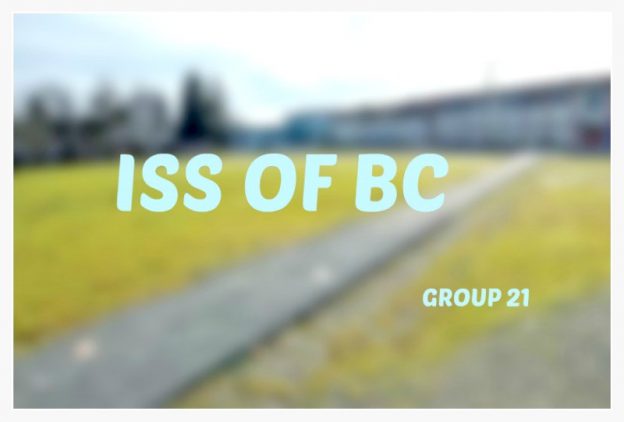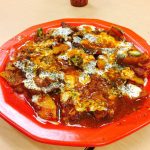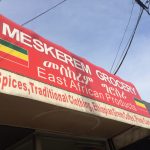Helloooo everyone,
HAVE you ever played “TREASURE HUNTING” games before? Is it fun? Right! Here is our project—finding treasure (assets) within a community, and complile a TREASURE MAP!! —We are excited to get involved with the community project “Recipe + Food Resource Guide for New Afghan Immigrants”, collaborated with Immigrant Services Society of BC.
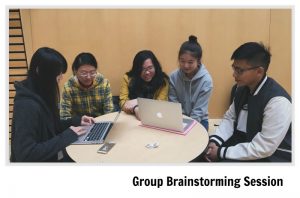
Introduction, interests, and reasons for choosing the project
First, let’s introduce ourselves. The five of us, Amellia, Patty, Wen, Yihan and Zowie (in an order with first name initials), are students from the Faculty of Land and Food Systems of UBC.
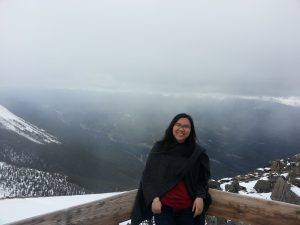 Hi! My name is Amellia Sudjana. I’m in Food, Nutrition and Health program. I choose this project because I’m interested in making a recipe book and an asset map, as well as the desire to help the immigrants. I came from Indonesia and I understand the feeling of being a newcomer in an unfamiliar place very well since I also experienced it around two years ago. Fortunately, I have an uncle who helped me adapting my life here in Vancouver. He gave me all of the information I needed such as how to apply for MSP, where to buy groceries, and where to buy Indonesian food products. The last one is the most important information for me, because food is the one which helped me adjusting my life here in Vancouver the most. Whenever I eat Indonesian food, I always feel like at home. I want to help the new Afghan immigrants by creating an asset map which is easy and convenient to use; so they can feel at home and adjust their life faster in Vancouver.
Hi! My name is Amellia Sudjana. I’m in Food, Nutrition and Health program. I choose this project because I’m interested in making a recipe book and an asset map, as well as the desire to help the immigrants. I came from Indonesia and I understand the feeling of being a newcomer in an unfamiliar place very well since I also experienced it around two years ago. Fortunately, I have an uncle who helped me adapting my life here in Vancouver. He gave me all of the information I needed such as how to apply for MSP, where to buy groceries, and where to buy Indonesian food products. The last one is the most important information for me, because food is the one which helped me adjusting my life here in Vancouver the most. Whenever I eat Indonesian food, I always feel like at home. I want to help the new Afghan immigrants by creating an asset map which is easy and convenient to use; so they can feel at home and adjust their life faster in Vancouver.
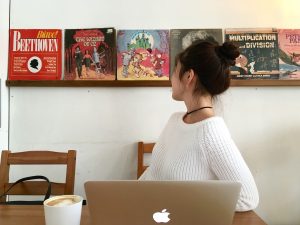
Hi, everyone, my name is Puchen Zhu (Patty). I am currently in Food, Nutrition and Health program. I like cooking and baking. It is my dream and goal to open a bakery in the future. I also have huge interest in trying new foods. Preparing recipe and resource guides for new and senior immigrants is an exciting thing for me; this is not only a great opportunity to discover experiences and more foods of afghan immigrants but also to develop the communication skills with community. I have experienced hard and struggling time to start and build my new live since my first time came to Canada. I think immigrants and newcomers might have same situation as mine; thus, I think it will be very pleasant to help afghan immigrants.
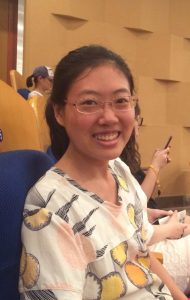
My name is Wen Xie and I am in Food Science program. This project is attractive to me because of my personal experience. I come from Beijing, China, and throughout the past years, I have always been eating at home and I am quite used to eating homemade food by my grandma and parents, which has unique fancy to me, and only those unique food could bring a constant pleasure to me. When I come to Canada, I find myself cannot get used to dining out too often because the flavor doesn’t fit my bud that much to have them everyday. So what I do is to go to groceries, find vegetables that are commonly appears in the dishes made by my family members:) That is quite a similar situation for new immigrants and it is because of this that I become interested in this project!
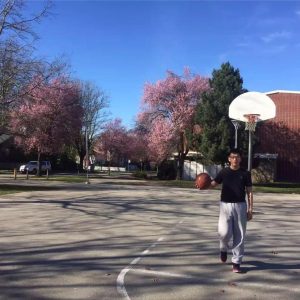
Hello everyone, my name is Yihan Qiu and I am currently in the food science major. I have range of interests, including various of sports, driving, cooking, finding tasty foods, travelling, and etc. Besides these, applying my very own knowledge and trying to help other people are also one of my interests. That is, in this project, I can use my knowledge to give some provide some help to the Afghan immigrant community.

Hello everyone! My name is Zowie Shu and I am currently majoring in Nutritional Sciences. Outside of school, I enjoy hiking, singing, baking, and travelling. It is my goal to travel to and experience as many parts of the world as I can! This project presents a very valuable experience to me because I have been living in Burnaby for nearly ten years now, yet the project presented aspects of my community which I did not previously know about. Although I have lived in the neighborhood for so long, I realized I really didn’t know that much about the assets available around me, so this project would allow me to learn more about the community which I am a part of. Not to mention, having had the experience of immigrating to Canada, I understand the struggles of settling down in an entirely new country, where language and cultural differences are just a few of the challenges that newcomers have to face every day, so the opportunity to help Afghan immigrants and refugees overcome those challenges is one I find very rewarding.
Goals and Objectives
As what is emphasized all through LFS 350, this is an ABCD (Asset Based Community Development) project. In this project, we will identify the retailers that sell low-cost and culturally appropriate ingredients around Burnaby Edmonds neighbourhood, in order to improve food security conditions in the Afghan immigrants community.
McCullum et al (2005) examined a three-stage strategy to build community food security, with the first stage being identifying income versus price situations within the neighbourhood and helping the community find alternative food systems. The objective of our project is basically to realize the first stage, helping building the community food security, with ideally all members having access to affordable and culturally appropriate food.
This project is driven by community service members, consisting of dedicated people who know the background and the need of the residents living within that community very well, with some of the community service members having the same cultural background, because it is extremely important to take ethnicity, social and and political location into account during the process of achieving food justice (Dixon, 2013).The idea for the project arose when the struggle many senior Afghan immigrants in the community faced in obtaining affordable and culturally appropriate foods became known to ISSBC. Low and limited income, lack of transportation and the language barrier are just some of the difficulties this vulnerable population face.
The Immigrant Services Society of BC
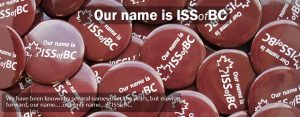 The Immigrant Services Society of BC is the oldest and the largest not-for-profit multicultural immigrant-serving agency in BC. It has over 400 staff and 1000 active volunteers located in 17 sites throughout BC. Its goal is to help immigrants to live well and build a future in Canada, in areas of ESL training, general education, settlement and employment. Furthermore, they continuously develop partnerships with local communities and to advance a unified and equitable community.
The Immigrant Services Society of BC is the oldest and the largest not-for-profit multicultural immigrant-serving agency in BC. It has over 400 staff and 1000 active volunteers located in 17 sites throughout BC. Its goal is to help immigrants to live well and build a future in Canada, in areas of ESL training, general education, settlement and employment. Furthermore, they continuously develop partnerships with local communities and to advance a unified and equitable community.
After reading Mathie and Cunningham’s (2003) article, we learnt that stronger and accountable governance at local level has a more important role in fueling the local associations. After we leant about the ISSofBC both online and by listening to Thea, the community service manager’s introduction in person, we got a sense that ISSofBC is likely to be playing an essential role in the community, including the food security of the community.
First impressions of process to date
Prior to meeting with Thea, the manager at Settlement Services Burnaby of the Immigration Services Society of BC, we were slightly confused and apprehensive about the project we just undertook and what exactly did it entailed. None of us were familiar with food asset maps, having only learned vague concepts of the idea in class. What exactly is it? What types of information should it convey? And most importantly, just exactly why is an asset map needed?
With our heads full of questions, we made the hour-long trip on Sept. 21st to East Burnaby to meet with our project correspondence at ISSBC.
Upon arriving, we were slightly surprised to find ourselves looking at what appeared to be a school-turned-multi-use office complex that was shared by several other organizations. The office was small, consisting of only a classroom-sized space divided into several cubicles. But upon being introduced by Thea to their staff, we immediately realized that although their space was small, they were certainly not lacking in passion and enthusiasm for the work they do and for the members of the community they serve. Between the six or seven people that worked there, they were able to provide services in at least four different languages, and covered different target populations from newly arrived refugees to immigrants and naturalized citizens of all ages and backgrounds.
The meeting quickly turned from one of awkward, slightly embarrassing introductions into a truly eye-opening experience for us. Like Ernesto Sirolli had talked about in his TED talk, help began with sitting down and listening to the needs of the people you are helping, and that’s what we did as Thea accounted the story of how the idea for the project came to be. The idea of a recipe book and asset map arose from some senior Afghan ladies, and Thea shared with us some of the things she learned about this vulnerable, yet often overlooked population. While we were aware that food insecurity issues often existed within refugee and immigrant communities, it was an entirely different experience to hear first and second hand accounts of the struggles these senior Afghan women faced on a daily basis. It was evident from the solemn expressions on everyone’s faces that we were all shocked and upset to learn that many of these senior women struggled to afford three meals a day, and often had to make the difficult choice between medication and food. As Thea explained the project details to us, it became increasingly clear to us how this seemingly small project could impact the community and help those vulnerable populations in need, and brains quickly turned as we jumped right into the various details of project planning process.
An opportunity that we had not previously considered emerged when Thea mentioned that we could have a meeting with the senior Afghan ladies to cook together and exchange some recipes from our own cultures. The chance to have some delicious food was of course very enticing, but more than that, it gives us the chance to meet directly with the members of the community our project aims to help, and listen to some of their needs and ideas in how they would like to see the recipe book and resource guide being utilized. Ernesto Sirolli also mentioned in his talk the importance of just “shut up and listen” to the community before helping them; listen to what they want to do, what they are passionate about, what their idea is, and what they needed to realize the idea, because it is their opinions that is the most important. We are here just to help them, not to tell them what they should do. Sirolli also said, “The first principle of aid is respect”. We should respect their opinions and their needs in order to truly help them.
By the end of the day, we were both subdued and hopeful about the prospects of our project. Subdued, because we saw the gravity of the food security issue that exists so closely inside our community; and hopeful, because of the chance our project has to make some real, practical difference within the community, however small it may be. The real reward for us, however, is the sense of awareness we gained in how complex is the issue of food security which exists far beyond the classroom lectures and journals and literatures; awareness which we hope to carry through the rest of our project, through our education here in the Faculty of Land and Food Systems at UBC, and beyond.
References
Mathie, A., & Cunningham, G. (2003). From clients to citizens: Asset-based community development as a strategy for community-driven development. Development in Practice, 13(5), 474-486. doi:10.1080/0961452032000125857
McCullum, C., Desjardins, E., Kraak, V. I., Ladipo, P., & Costello, H. (2005). Evidence-based strategies to build community food security. Journal of the American Dietetic Association, 105(2), 278-283. doi:10.1016/j.jada.2004.12.015
Dixon, B. A. (2014). Learning to see food justice. Agriculture and Human Values, 31(2), 175-184. doi:10.1007/s10460-013-9465-3
